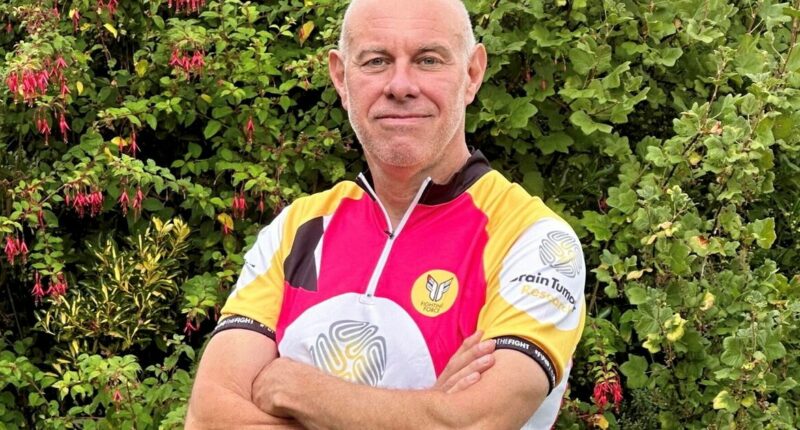Share this @internewscast.com
A man who seemed to be intoxicated during his commute found out he actually had a brain tumour, which was initially misdiagnosed as vertigo. John Starns, 63, was traveling to work in central London when he suddenly felt ill and had to exit the train in Sevenoaks.
For the next two hours, he sat slumped and sweating on a bench, while he noticed that commuters passed by, likely thinking he was just drunk. John visited his doctor and was first diagnosed with vertigo.
However, when his condition didn’t improve, an MRI scan three months later revealed he had a vestibular schwannoma brain tumour. He learned that his tumor was benign and now undergoes scans every two years to keep an eye on it.
John, a freelance photographer, from Sutton Valence, Kent, said: “It felt as though I was having a panic attack. I was disorientated and it became difficult to walk. I found a bench and sat there for two hours, alone. No one approached me, I suspect because they thought I was drunk.
John began feeling unwell in February 2022, and in 2023 he started to experience “significant spells of dizziness” that he described as worrying and debilitating. “At their worst, all I could do was lie down with my eyes closed and wait for the symptoms to recede,” he recalled.
John was shocked when he was diagnosed with a tumour, but felt relieved when told it was benign. He said: “MRI brain scans at Kings College Hospital followed, and I will never forget the emotional release I experienced when the lovely nurse called me to let me know that my tumour was benign. It was a very scary process to have to go through.”
He added: “So far, scans have shown my tumour as stable, and I barely suffer from any side effects. I am one of the lucky ones, but this isn’t about me.” John, a keen cyclist, is now passionate about fundraising and is supporting Brain Tumour Research. He is gearing up for Cycle 274 Miles in August, a month-long fundraiser.
He said: “I’m committing to this cycle challenge to raise awareness of the disease and the desperate inadequacies that currently exist in the historic underfunding of brain tumours compared to other cancers. I cycle up to 20 miles a day, so I’ll have no problems reaching the 274-mile target.
“My story could have ended differently. That’s the reality for others. My hope is that by supporting Brain Tumour Research, more people will benefit from the advances in research.”
Charlie Allsebrook, community development manager at Brain Tumour Research, said: “John’s story is not uncommon, brain tumours are indiscriminate and can affect anyone at any age. One in three people in the UK knows someone affected by a brain tumour, but Brain Tumour Research is working to change this.
“It’s with the support of people like John that we will help drive investment towards research into brain tumours. Good luck, John!” To donate to the GoFundMe page, visit this link.
What is a vestibular schwannoma brain tumour?
Vestibular schwannomas, commonly known as acoustic neuromas, are benign brain tumors that originate in the nerve linking the brain to the ear. These tumors develop from Schwann cells, which are fatty cells located on the outer layer of nerves.
Typically, vestibular schwannomas arise from the Schwann cells surrounding the vestibulocochlear nerve, which connects the brain to the ear and regulates hearing and balance. Vestibular schwannomas do not metastasize to other areas of the body. Due to their slow growth over several years, symptoms often do not appear for a considerable amount of time.
When you do have symptoms, they can be:
- hearing loss that usually affects one ear
- ringing and buzzing sounds in 1 or both ears (tinnitus)
- difficulty working out where sounds are coming from
- dizziness or vertigo
- numbness of the face (this usually only happens in advanced tumours)
Cancer Research UK says: “Vestibular schwannomas are rare tumours. About 8 out of every 100 brain tumours (about 8%) are vestibular schwannomas. Your risk of developing this tumour increases as you get older. The risk is greatest in those aged between 65 and 74 years old.
“Rarely, vestibular schwannomas are caused by a genetic condition called neurofibromatosis. People with neurofibromatosis are often diagnosed at a much younger age. They usually develop tumours on both sides of the brain (bilateral).”












